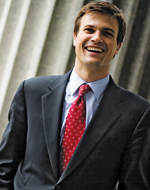Financial Storms And A Capital Opportunity
Jeb Mason ’99 thought his federal government duties might slow down as the George W. Bush presidential administration drew to a close last fall. But as the nation’s financial crisis grew graver, it became clear there would be no downturn for his responsibilities.

Jeb Mason ’99 thought his federal government duties might slow down as the George W. Bush presidential administration drew to a close last fall. But as the nation’s financial crisis grew graver, it became clear there would be no downturn for his responsibilities.

Mason’s final days with the Bush administration focused on the Troubled Assets Relief Program (TARP) and the federal government’s effort to stabilize the financial system. Mason managed the Treasury Department’s outreach to business, advocacy and financial communities, requesting information and opinions from many interests and then advising the Secretary and senior officials of these perspectives, and crafting strategies to communicate Administration policies to these groups.
He was central to organizing support for the Emergency Economic Stabilization Act of 2008. He spent 18 months helping to conceive and organize the coalition of mortgage servicers, nonprofit credit counseling agencies and investors called the HOPE Now Alliance, the mission of which is to help at-risk homeowners keep their houses.
After earning a B.A. in public policy and a B.S. in economics from SMU, Mason went to Washington, D.C., to volunteer for the Bush-Cheney transition and never left. He also has worked for the U.S. Department of Defense, which included assignments at the White House and the Department of Homeland Security and a five-month stint in Iraq. He also worked on the 2004 Bush-Cheney re-election campaign. A second White House post was in the Office of Strategic Initiatives – affectionately known internally as “strategery,” he says.
While a student, Mason led the SMU chapter of the Young Conservatives of Texas and was an officer of the Political Science Symposium. He also was an officer for his fraternity, Lambda Chi Alpha, and served in the Student Senate.
He says he used to joke that a “double major was due more to indecision than ambition,” as well as an indulgence of his inquisitive nature. His multipurpose skills, however, have served him well. “Economics provided an analytical framework for considering problems, public policy study provided insight about organizational dynamics and power, and courses in finance obviously came in handy in the recent turmoil,” he says
Washington, D.C., is full of prospects for young go-getters, he says. “There’s always more work than can possibly be done and opportunity to be entrepreneurial for those with adaptable skills. There’s plenty of room to learn, grow and have an impact.”
After a busy eight years in the nation’s capital, Mason’s life is calmer today as he ponders his next career move. He plans to do some independent consulting and catch up with family and friends but hopes to make his way back to Texas soon.
– Story written by Cherri Gann